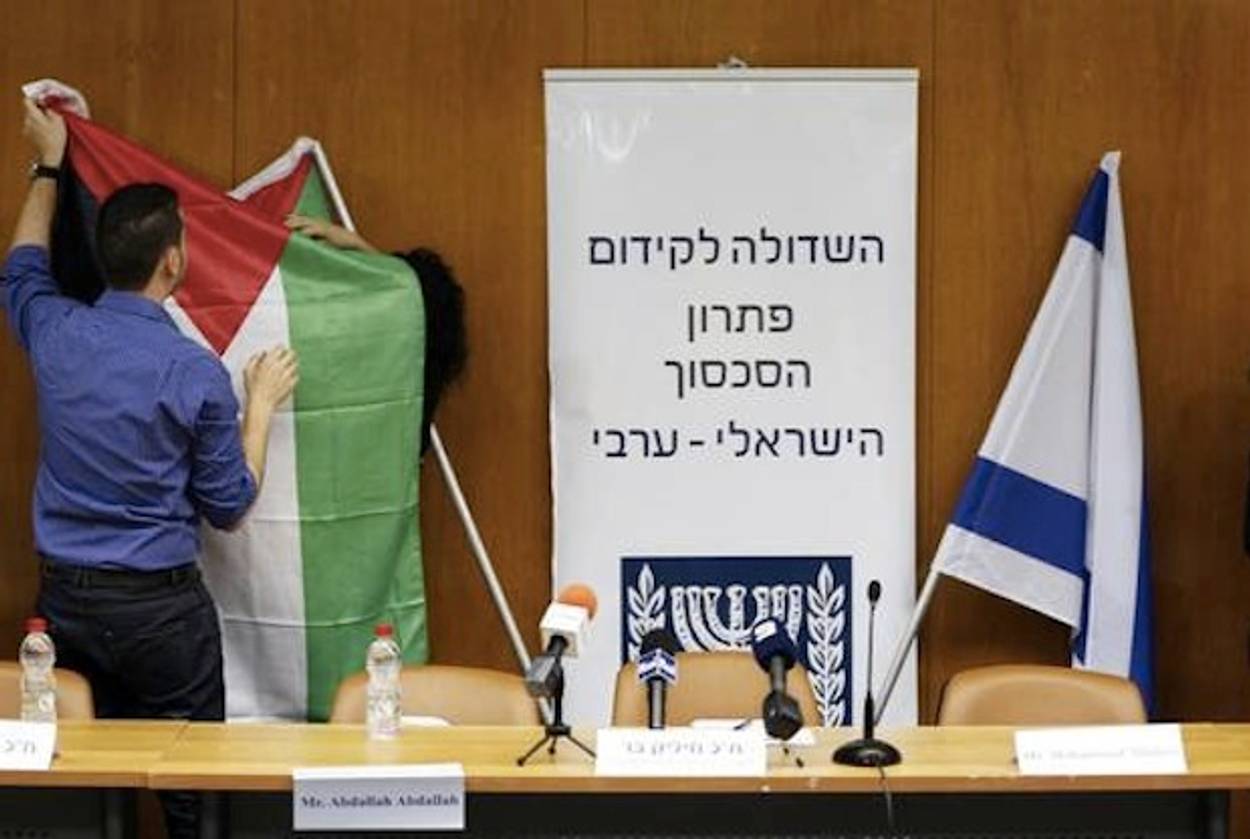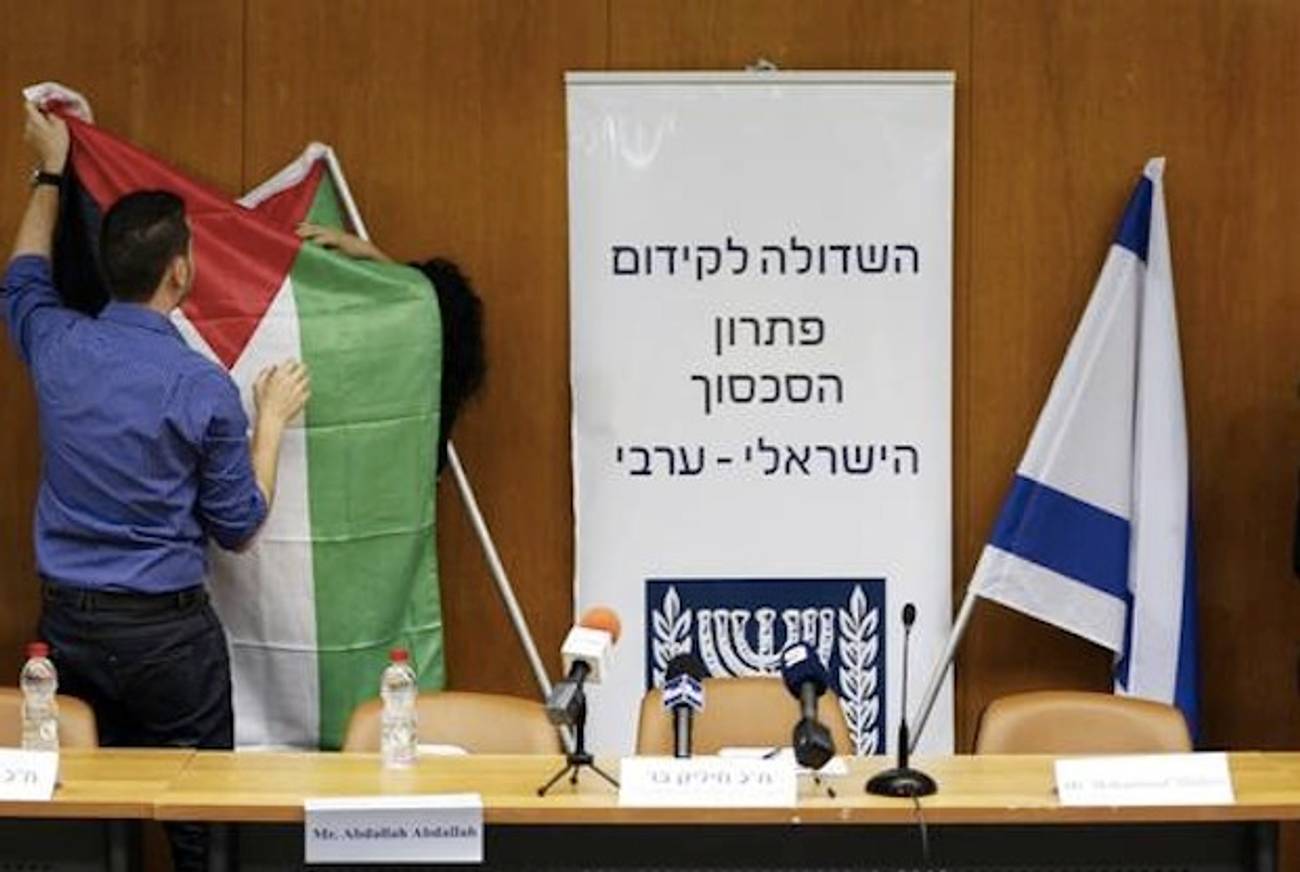Day 3: Peace Talks Set, Will Begin in Two Weeks
Israeli Knesset OKs referendum bill on withdrawal




The last two days may have be filled with the expected doubt and skepticism of a peace process that few believe will bear fruit (or peace for the matter), but on the third day, the jigsaw began to fall into place. Or less abstractly, the format for the peace talks has been set as the officials on each side aim to cover their bases.
During a contentious, all-night meeting in the Knesset last night, Israeli lawmakers voted to approve a bill requiring a referendum on any peace deal where Israel would cede territory that it has formally annexed. This is shorthand for Israel, the Golan Heights, and East Jerusalem, and leaves out the West Bank.
The bill reinforces an earlier law, passed in 2010, that requires the government to obtain a two-thirds Knesset majority or public approval via a referendum in order to sign away any Israeli territory. It aims to make the referendum bill a semi-constitutional Basic Law, putting it beyond the reach of the Supreme Court, which can theoretically strike down any regular law.
It still must be reviewed by the Knesset House Committee and faces two more readings, which will likely take place during the Knesset’s winter session, before it can be signed into law.
The bill had the support of Israeli Prime Minister Benjamin Netanyahu and was championed by Jewish Home head Naftali Bennett (albeit for totally different reasons). Opposition to the bill included Justice Minister Tzipi Livni and Yisrael Beiteinu chief Avigdor Lieberman (albeit also for totally different reasons).
It’s a compelling microcosm for the renewal of talks. Bibi supports the referendum bill, in part because politically he has to, but also because he’s confident that if he brings a peace deal to the Israeli public, they will endorse it. Bennett, no fan of the peace process, supports the referendum as a safeguard against the government making peace without the will of the people. Livni opposes it because it hinders the peace process and Lieberman opposes it because he hates the peace process. (Either all that or I’ve been watching too much Big Brother.)
Meanwhile, the delegations having left Washington, D.C. and with Secretary of State John Kerry having already jaunted off to Pakistan on a surprise visit, the format for the peace talks has been set and will begin in the second week of August, alternating between Ramallah and Jerusalem.
Shall we crack open the arak? Not just yet. The challenges remain obvious and many. For a real and real depressing look, read Jeffrey Goldberg’s column titled “Seven Reasons Kerry’s Mideast Talks Are Delusional,” part of his summer Doom and Delusion series.
Nevertheless, the White House isn’t taking that tack and was correct to point out that conditions have changed both in Israel and the United States that favor a different outcome than the 2010 peace talks that stalled before they really got underway.
“There’s new circumstances, there have been elections in Israel, there’s another election here, we have a new secretary of state,” a senior White House official said Tuesday.
Add to this regional uncertainty (to put it too mildly) and the enhanced roles of both the United Nations and the European Union in putting a squeeze on the Israelis in recent months, balanced with American language and efforts that have possibly never looked more supportive of Israel, perhaps a workable balance has been struck.
American officials are working to ensure that the massive economic benefits of a final status agreement are known to the Palestinians and by opening with Kerry’s statement that “all core issues” will be discussed, the Americans are trying to show the Palestinians that they mean business. Meanwhile, they are also trying to show the Israelis that issues surrounding their top concern about the negotiations–security–are being handled. As JPost reports, U.S. General John Allen is working on security arrangements as a special envoy.
The security arrangements are critical for any agreement, and therefore Gen. Allen is working on them,” a senior U.S. official said Wednesday.
Allen was appointed by US Secretary of Defense Chuck Hagel in May to serve as the US special envoy on security issues, and to develop a security plan for a final Israeli-Palestinian agreement.
Will it all work? Who knows? But the bases are being covered. Perhaps, one hopeful sign: Yesterday, a group of Palestinian officials made an unprecedented trip to Knesset to meet with 30 of their Israeli counterparts. In the large Knesset meeting hall, a Palestinian flag was raised beside an Israeli one.
Adam Chandler was previously a staff writer at Tablet. His work has appeared in the New York Times, the Wall Street Journal, the Atlantic, Slate, Esquire, New York, and elsewhere. He tweets @allmychandler.